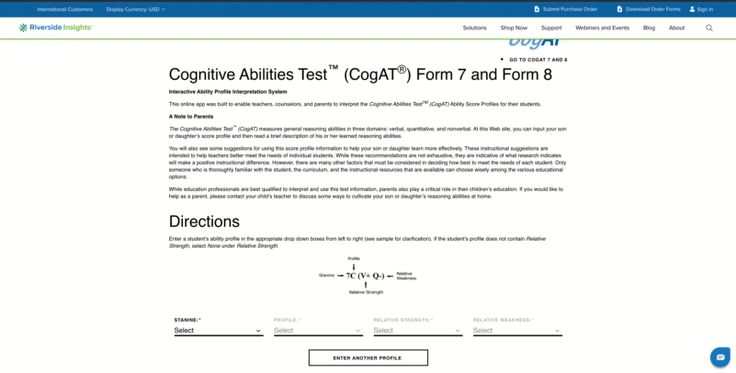A Parent's Guide to Ability and Student Learning

The Cognitive Abilities Test™ (CogAT®) is an assessment given in many school systems to provide a view into a student’s reasoning abilities. A short video describing CogAT is available here. Student reasoning ability is fundamentally different from achievement, although the two are closely related.
If your child has taken CogAT in school, the results might include an Ability Profile™ score. The Ability Profile score offers a quick summary of your student’s overall ability score and areas of relative strength and weakness across areas that are closely related to success in school, including Verbal, Quantitative, and Nonverbal (figural) reasoning. You can use this information to access some specific instructional tips that have worked for students with a similar profile.
Enter your child’s Ability Profile into CogAT.com for a profile explanation, characteristics of students with these profiles, and instructional suggestions:
When you input your child’s Ability Profile and read the information, first ask yourself, “Does this sound like my child?” If not, you may want to consult with your child’s teacher about using these scores. If it does sound like your child, use this information to build from your student’s strengths to help them improve areas that are not as strong. For instance, students who are good in areas like reading and vocabulary but are challenged by math may need to use words to talk through math problems. On the other hand, students who are stronger in quantitative reasoning may learn in other areas by focusing on rules and organization, such as learning rules of grammar or sequence-based systems like programming and computer languages. One thing to watch out for during this child-driven learning period is to encourage the student to engage in their weaker areas. Their preference will likely be to stick to their strengths and may lead to greater differences in their profile of abilities.
Your child’s CogAT scores may change over time. Just like other skills, reasoning ability can be affected by growth, practice, and motivation. Students’ patterns of strengths and weakness can change also. This is normal; just as kids have physical growth spurts, they can have intellectual growth spurts. In particular, it is important to recognize that the skills that help us solve problems are useful for learning, and these abilities are not fixed - but can continue to develop and grow. Ability levels are affected by both biology and learning opportunity; therefore, lasting improvement in reasoning abilities can be made by working on them just as you would for any other skill.
Dr. Joni Lakin, author of the CogAT, previously posted about how to help students dvelop spatial problem solving abilities. Spatial thinking skills help us visualize solutions to new and interesting problems and help boost student achievement in areas like science and math. Dr. Lakin suggests some simple activities for spatial skill development that you might want to try at home. These activities are creative and fun, and they will encourage your child to work independently.




.png?width=900&name=Riverside%20Insights%20Acquires%20Aperture%20Education%20(3).png)
-1.png)